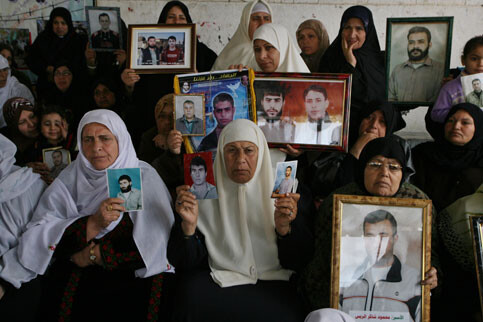The Electronic Intifada 26 February 2008

Women in Gaza City protest the detention of their loved ones in Israeli prisons, where torture is regularly practiced, February 2008. (Wissam Nassar/MaanImages)
Israeli Ambassador Alan Baker recently expressed his indignation over Canada’s listing of Israel as a state that engages in torture in a training manual for diplomats.
The ambassador asserts that torture is not practiced by Israel and based on this it seems that the Canadian Foreign Ministry will reevaluate this manual and “correct” it. The problem, however, is not the manual but the fact that Israel continues to regularly practice torture.
The ambassador claimed that allegations of torture, such as those made by The Public Committee Against Torture in Israel (PCATI), are questionable. In November 2007 PCATI began to handle an especially egregious case of the abusive use of handcuffing in which the detainee upon remand complained of and displayed evidence of having been tortured. The military judge ordered that the detainee be examined. Subsequent neurological examinations in an Israeli hospital demonstrated that the detainee suffered lasting injury to his hands. PCATI filed a major complaint on this matter and asserts that it is further evidence of the systematic nature of this practice. This case was reported on by Gideon Levy in Israel’s Haaretz newspaper in which he quoted the victim’s affidavit:
“Captain Adi sat behind me and began to slap my face and ordered me to bend backward, and when I got tired of holding myself in the air he would push me backward and leave me in this painful position for several minutes and pick me up by the shirt and push me backward. Captain Effie … would place his hand under the chair, grab my hands beneath my back and pull toward him. Afterward Effie took off my handcuffs, placed each of my hands in a sock and bound my hands behind my back. Afterward he brought different handcuffs, tightened them on my forefingers, with my hands bound behind me, and then another interrogator joined and each of the interrogators began to tighten the handcuffs on my hands with all his strength, and one interrogator would hold me by the neck at the same time and slap my face. The interrogators used this torture for five to ten minutes, during which I would scream with pain and beg them to stop, while some of them laughed at me” (“Twilight Zone: A window on interrogation,” Haaretz, 10 January 2008).
PCATI regularly documents and protests cases of torture and inhuman treatment. We seek to compel the state to stop using torture and at the very least, to honor the 1999 Israeli high court precedent handed down following a petition filed by PCATI and other organizations. Many people, including, apparently, Israel’s ambassador to Canada, claim that following the judgment torture has been abolished in Israel. This claim is mistaken.
The state continues to use torture. The judgment, as important as it was, did not categorically outlaw torture and ill treatment and one can argue that it even facilitated its continued use by institutionalizing the “ticking bomb/necessity defense” loophole.
Detainees continue to be illegally abused during arrest and later in interrogation. They are regularly held incommunicado, denied access to attorneys for extended periods. They are too often injured and then examined by physician, who may fail to properly document the injury and its cause and subsequently return the victim to an abusive interrogation.
Hundreds of complaints by torture victims have been served since the court’s judgment only to be “investigated” by an active General Security Service/Shin Bet security agent and systematically dismissed by the State Attorney’s office. One may choose to believe that torture has been “abolished in Israel” but it continues with impunity.
We seek to prevent torture where it exists and, by doing so, protect the most basic principles of democracy, human dignity and human rights. Torture is best prevented by the actions of civil society organizations: litigation; public education; holding torturers accountable; supporting monitoring mechanisms; and demanding an end to impunity. But as long as states, democratic or otherwise, continue to torture and deny it the scourge will remain.
Louis Frankenthaler is the Development and International Outreach Director at the Public Committee Against Torture in Israel (PCATI). PCATI’s new report, “Ticking Bombs: Testimonies of Torture Victims in Israel.” This article was originally published by Palestine Chronicle and is republished with the author’s permission.
Related Links



